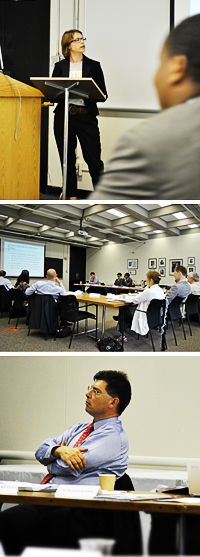An international gathering of doctoral students at the Faculty of Law encourages a lively exchange of ideas

Ingredients:
- Eleven doctoral and post-doctoral researchers, each presenting a paper on international law;
- Four Faculty professors armed with thought-provoking comments and questions;
- One U-shaped conference table;
- Unlimited amounts of coffee and tea
Method:
- Combine ingredients under the auspices of one-day event in New Chancellor Day Hall;
- Dedicate seminar to former Dean Maxwell Cohen, whose career epitomized a lifetime commitment to international law;
- Schedule event in late June so participants can theorize by day and take in the Festival International de Jazz de Montreal by night
Result:
- The first Dean Maxwell and Isle Cohen Seminar in International Law, a one-day forum peppered with vigorous debate, keen expertise and unwavering collegiality.
Notes on the recipe:
The discussions were abstract, even abstruse – by design.
“We wanted this to be a venue for students at the highest level of study,” said François Crépeau (seen on last picture on right), Hans and Tamar Oppenheimer Professor of Public International Law and one of the organizers of the seminar. “The idea is to have them present and discuss their research ideas with each other and bring their areas of expertise to the discussion.”
Sunil Kumar Agarwal, a research associate at the National Maritime Foundation and holder of a PhD in International Law from Jawaharlal Nehru University in New Delhi, echoed this sentiment.
“I came here because I wanted to discuss with other doctoral students,” he said. “Graduate and undergraduate students in law have a lot of contributions to make, but maybe they will go on to do other things besides law. With doctoral students, everyone is specialized in law.”
The eleven participants, chosen from among the thirty candidates who submitted a paper, approached the day with analytical goodwill, probing each others’ arguments, questioning each others’ assumptions and applauding ground-breaking research.
“I had three theoretical approaches that I had considered for my presentation, including legal pluralism,” said Simon Tans, a PhD candidate at Radbound University Nijmegen who discussed labour migration under certain provisions set out by World Trade Organization and the European Union.
“I chose a fourth approach,” he admitted, drawing laughter from his colleagues, “which is good because [fellow presenter] Saeid Yengejeh dealt extensively with legal pluralism. I chose a comparative model instead.”
Having the opportunity to simultaneously analyze not only legal pluralism but also comparative models as well as the normative effectiveness of law and many other theoretical concepts is “a testament to the usefulness of the conference,” Tans added.
“International arbitration is an increasingly important subject,” said Yengejeh, a PhD candidate at the University of Ottawa, whose presentation considered United Nations Security Council resolutions on counter-terrorism and non-proliferation of weapons of mass destruction.
“At the same time, international arbitration is also a very complex topic,” he said. “It’s a privilege to be able to discuss it in depth and at length in this seminar.”
By Victoria Leenders-Cheng
Find out more about the Hans and Tamar Oppenheimer Chair of Public International Law.
